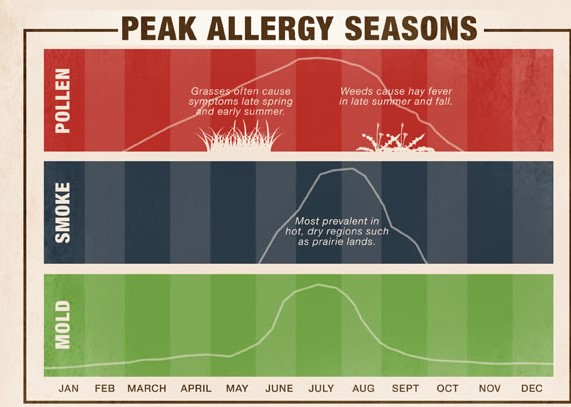This article contains affiliate links. If you make a purchase after clicking on a link I may earn a small commission at no extra cost to you.
An allergic reaction is an inappropriate immune-system response that causes symptoms in a certain subset of the population.
Specificity is the hallmark of all immune responses. People are usually allergic to only a few specific substances.
For example, someone sensitive only to the allergen found in red cedar dust will react on inhaling this tree compound, not others; those sensitive only to the protein in cat dander will respond to, that, not to animals in general; those allergic only to certain shellfish will react on eating those varieties but not others; and so on.
[box style=”rounded”]Thus, although many people say they’re “allergic” to something because they feel it has some vague effect on them, the allergic response is not vague; it’s a definite, identifiable immune-system activity triggered by a particular foreign agent that’s harmless to most people.[/box]
Knowing how the immune system produces allergic symptoms can help you control it.
It can also help you understand the many new approaches that are under scientific study.

Where Does the Allergic Response Come From?
The allergic response results from the immune system’s remarkable ability to distinguish “self” from “non-self” substances, and its ceaseless attempt to fend off agents that are “non-self,” which are termed antigens.
The body’s immune defenses are gradually built up from birth onwards, as we encounter more and more environmental agents. Every second of the day our bodies face an onslaught of bacteria, viruses and other potentially harmful microorganisms and chemicals.
These tiny, unseen attackers are first warded off by the body’s front-line defenses, such as the skin.
Those that manage to get past these defenses and enter the body, through breaks in the skin or by penetrating mucous membranes in the nose, throat, gut, or urinary or genital tract, are attacked by the immune system with a complex array of weapons that destroy invading intruders so they cannot make us ill or kill us.
Blood rushes to the site, bearing white blood cells that engulf or destroy the foreign intruders; antibodies made by lymphocytes (special white cells) help to inactivate specific invading antigens.
Some lymphocytes have an inbuilt “memory,” so that once a harmful antigen has been fought off, the immune system is “tagged” to recognize its re-entry and rapidly destroy it in the future, should it ever again penetrate the body.
Unlike most antigens, which are potentially dangerous, the distinguishing feature of allergens (allergy triggers) is that they are substances harmless to most people. Many allergens are commonplace proteins in foods, plants or animals, and the immune-system response to these innocuous substances that takes place in allergy-prone people amounts to overkill. IgE antibodies are inappropriately manufactured against harmless agents such as pollens, animal dander, or even nutritious staples such as peanuts, eggs and milk.
The IgE antibodies bind to mast cells in the mucous (lining) layers, and to basophils in the blood, stimulating them to “degranulate” and release powerful vasoactive mediators. (“Vasoactive” comes from the Latin vas, or “vessel.”)
The mediators — histamine, leukotrienes and a host of others —make blood vessels dilate and become “leaky,” producing swelling and the all-too-familiar signs of allergy — the itching, rash, hives, weepy eyes, sneezing, nasal discharge, inflammation and other discomforts. In severe cases, respiratory failure, allergic shock and death may occur.
Why should so irritating, useless and health-harming an immune-system response have evolved? Scientists surmise that allergies may be part of the evolutionary development of the body’s immune defenses mounted against parasites that were once rampant. In other words, the body’s exaggerated immune response may be a throwback to the days when it was a valuable defense against widespread and harmful parasites such as intestinal worms and insect larvae — parasites that now no longer exist in most places.
Such immune-system reactions do still occur when the body needs to clear itself of parasites. However, scientists do not yet fully understand why some people mount an attack against innocuous substances as though they were parasites, while most do not.
